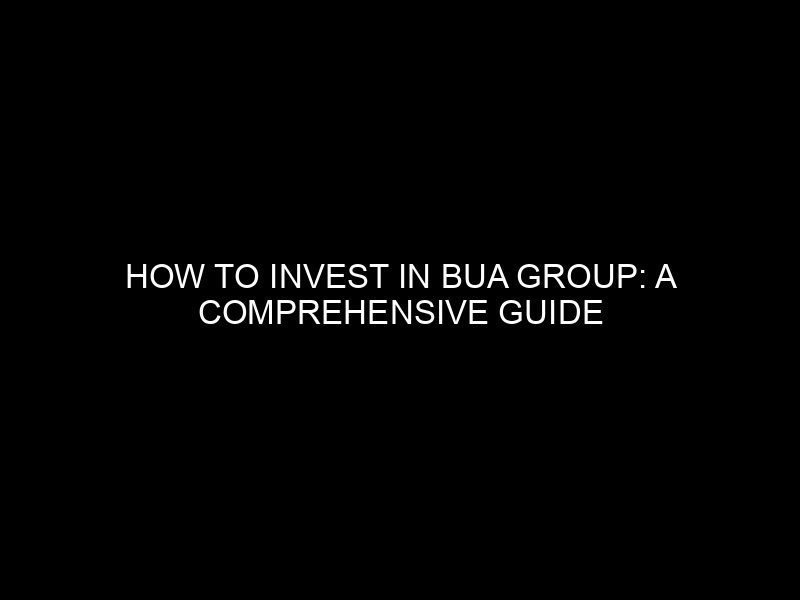As an expert with a background in Nigerian business and specific insights into BUA Group, I am excited to share my knowledge about investing in one of Nigeria’s most dynamic and rapidly growing industrial conglomerates. BUA Group, founded by Nigerian industrialist Abdulsamad Rabiu in 1988, has become a beacon of Nigeria’s economic progress. The company’s diverse interests in cement production, sugar refining, real estate, steel, port concessions, manufacturing, oil gas, and shipping have not only contributed significantly to Nigeria’s GDP but also offer a unique opportunity for investors looking to participate in Nigeria’s growth story.
Delving into Investment Opportunities at BUA Group
Understanding BUA Group’s Business Model and Growth Trajectory
Before diving into how to invest in BUA Group, it’s crucial to understand its business model and growth trajectory. BUA Group stands out for its strategic focus on essential industries that are critical to Nigeria’s development. The company’s commitment to investing in state-of-the-art technology and its emphasis on sustainability and community development positions it uniquely in the market. Over the years, BUA has shown a consistent track record of profitability and growth, driven by visionary leadership and a deep understanding of the African market.
Exploring Investment Avenues in BUA Group
Direct Investment in BUA Shares
As of my last update, BUA Group is privately held, meaning its shares are not publicly traded on a stock exchange. However, for high-net-worth individuals and institutional investors, direct investment opportunities might be available. This usually involves direct negotiations with the company for private share acquisitions.
Indirect Investment through BUA Subsidiaries
Alternatively, investors can consider indirect investment through subsidiaries of BUA Group that are publicly listed. For instance, BUA Cement, a subsidiary of BUA Group, is listed on the Nigeria Stock Exchange. Investing in BUA Cement shares can be a strategic way to indirectly invest in the BUA ecosystem.
Analyzing the Financial Health and Market Position of BUA Group
Investing in any company requires a thorough analysis of its financial health and market position. Prospective investors should review BUA Group’s financial statements, market share, competitive position, management team, corporate governance practices, and growth prospects. This involves examining BUA’s revenue streams, profit margins, debt levels, investment in R&D, and expansion plans.
Related FAQs
Q1: How can international investors invest in BUA Group?
International investors can explore opportunities through partnerships, direct investments subject to Nigerian investment laws, or by investing in listed subsidiaries where applicable.
Q2: What are the risks associated with investing in BUA Group?
Investors should consider risks such as market volatility in the Nigerian economy, regulatory changes, global economic factors affecting commodity markets, and competition from other industrial conglomerates.
Q3: Has BUA Group shown a commitment to sustainable practices?
Yes, BUA Group has increasingly focused on sustainable business practices, including investments in environmentally friendly technologies and community development initiatives.
Q4: What is the future outlook for BUA Group?
With its diversified portfolio and strategic investments in key sectors of the Nigerian economy, BUA Group is well-positioned for continued growth. However, like any investment, market conditions and unforeseen events can affect future performance.
Q5: Can small investors participate in BUA Group’s growth?
While direct investment might be challenging for small investors, they can participate through listed subsidiaries or mutual funds that hold BUA Group assets.
Conclusion: Why BUA Group is a Promising Investment Option
Investing in BUA Group presents a unique opportunity to be part of Nigeria’s economic growth story. The company’s diversified portfolio, strong market position, and forward-looking strategies make it an attractive option for investors. However, like any investment, it is crucial to conduct thorough research and consider the risks and rewards. By understanding BUA Group’s business model, financial health, and market dynamics, investors can make informed decisions that align with their investment goals.

Leave a Reply